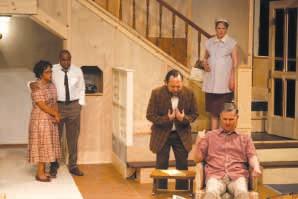
3 minute read
Art of the State
from June 4, 2015
Neighborhood watch
Clybourne Park
Advertisement
I wouldn’t have thought a play about real estate would be something I’d later call “powerful” or “provocative,” but Reno Little Theater’s latest production is both. Since I saw the opening-night performance of Clybourne Park, Bruce Norris’ 2010 Pulitzer- and Tony-award-winning play, I have thought constantly about issues it raised—the nature of community and neighborhood, assumptions we make about gentrification, and how talk about race in today’s “enlightened” society is still a minefield. Norris literally takes a page from Lorraine Hansberry’s Raisin in the Sun, a drama set in 1959 Chicago about the Youngers, a black family who buy a home in an all-white neighborhood amid fierce resistance. In Clybourne Park’s first act, we meet Russ (Bob Gabrielli) and Bev (LaRonda Etheridge), the home’s white owners who have, in their attempt to move quickly for personal reasons, unwittingly sold to a black family. As they and their black housekeeper, Francine (Andi Tyrell), pack for the move, they discover the facts from an angry neighbor, Karl Lindner (Keith Roberts), the Raisin in the Sun character desperate to “protect the integrity” of the neighborhood, who approaches Russ and Bev to beg them to reconsider. In Act Two, 50 years later, that same home is the site of further upheaval: the area’s gentrification after years of white flight and subsequent urban decay. Expecting parents Lindsay (Meghan Kirwin) and Steve (Christopher Willson) have purchased the home, hoping to
rebuild to accommodate their growing family in this up-and-coming neighborby hood. But they’ve met with resistance Jessica Santina from the black representatives of the housing board, Lena and Kevin (Tyrell 5 and Idris Ozoya), who resent what these changes represent. It’s easy to watch Act One and dismiss the language of 1959 as racist (“colored” or “Negro”), and Karl’s attitude as backward and ignorant. It’s terrible, but in a way we’re used to seeing. It’s antiquated, almost charming in its old-fashionedness. Where things get really uncomfortable is in Act Two, as supposedly sensitive, politically correct discourse reveals its own problems: How the “I-have-friends-who-are-black” way of thinking is laden with racism; how there is a presumption that gentrification benefits all concerned; how just because it’s not socially acceptable to say “colored” or “Negro” or “bitch” doesn’t mean those thoughts aren’t still there. The same seven actors appear in both acts, with ironic connections between their first- and second-act characters. For instance, Kirwin plays both Betsy—Karl’s deaf, pregnant, ineffectual wife in Act One—and the too-outspoken, pregnant, frustrated wife of another jackass in Act Two. In Act One, Christopher Willson plays Jim, a neighbor and clergyman who struggles in vain to defuse conflicts. In Act Two, he is Steve, the prospective homeowner who says too much of what he thinks. Endless parallels highlight the fact that the more things change, the more they stay the same. The performances are across-theboard excellent. In particular, LaRonda Etheridge proves enormously talented at subtle gestures and comedic timing as both Bev and as Kathy, the attorney who proves ineffective in brokering an agreement on the zoning issue. Roberts is so good at being the hateful Karl Lindner that he elicits a visceral response, embodying all we find disgusting about mid-century, white-/ male-centric thinking. Director Rod Hearn’s careful attention to set design, sound, and blocking help Clybourne Park feel more like a conversation or social experiment than a play. Early in Act One, Bev says, “That’s nice, isn’t it, in a way? To know we all have our place.” I promise, you will leave the theater questioning yourself and your community, and will ponder your own place in this world. Ω
Reno Little Theater's cast explores Clybourne Park in this rehearsal photo.
Clybourne Park by Bruce Norris is at Reno Little Theater, 147 E. Pueblo St., on June 4, 5, 6, 11, 12 and 13 at 7:30 p.m. and June 7, 13 and 14 at 2 p.m. Tickets: $16, general; $13 seniors, students and military, available online at www.renolittletheater. org or 813-8900.










